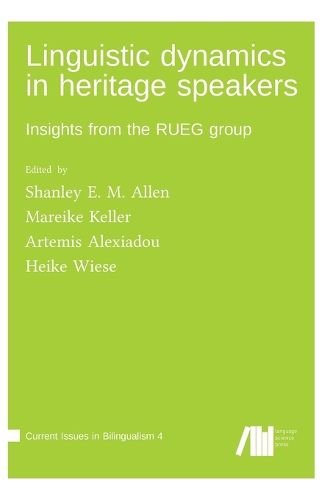Readings Newsletter
Become a Readings Member to make your shopping experience even easier.
Sign in or sign up for free!
You’re not far away from qualifying for FREE standard shipping within Australia
You’ve qualified for FREE standard shipping within Australia
The cart is loading…






This title is printed to order. This book may have been self-published. If so, we cannot guarantee the quality of the content. In the main most books will have gone through the editing process however some may not. We therefore suggest that you be aware of this before ordering this book. If in doubt check either the author or publisher’s details as we are unable to accept any returns unless they are faulty. Please contact us if you have any questions.
This collective volume investigates linguistic dynamics in language contact, focusing on heritage speakers. The chapters provide new insights into the role of speaker repertoires and the distinction between contact-induced change and language-internal variation by reporting on corpus-linguistic studies across different communicative situations in heritage and majority languages. Conducted in the context of the DFG Research Unit "Emerging Grammars in Language Contact Situations" (FOR 2537), the studies focus on bilingual adolescent and adult speakers of German, Greek, Russian and Turkish as heritage languages, and of English and German as majority languages, and on monolingually raised adolescent and adult speakers of all five languages. Crucially, they are not restricted to standard language, but target broader speaker repertoires that cover informal as well as formal settings in both spoken and written modes. The contributions are united by their positive perspective on language contact and multilingual speakers, a comparative approach across several heritage and majority languages, and a shared methodology that captures variation within repertoires for both heritage speakers and monolinguals. The chapters take various theoretical standpoints, highlighting different facets of the data as well as its potential for enhancing our understanding of language contact and language variation.
$9.00 standard shipping within Australia
FREE standard shipping within Australia for orders over $100.00
Express & International shipping calculated at checkout
This title is printed to order. This book may have been self-published. If so, we cannot guarantee the quality of the content. In the main most books will have gone through the editing process however some may not. We therefore suggest that you be aware of this before ordering this book. If in doubt check either the author or publisher’s details as we are unable to accept any returns unless they are faulty. Please contact us if you have any questions.
This collective volume investigates linguistic dynamics in language contact, focusing on heritage speakers. The chapters provide new insights into the role of speaker repertoires and the distinction between contact-induced change and language-internal variation by reporting on corpus-linguistic studies across different communicative situations in heritage and majority languages. Conducted in the context of the DFG Research Unit "Emerging Grammars in Language Contact Situations" (FOR 2537), the studies focus on bilingual adolescent and adult speakers of German, Greek, Russian and Turkish as heritage languages, and of English and German as majority languages, and on monolingually raised adolescent and adult speakers of all five languages. Crucially, they are not restricted to standard language, but target broader speaker repertoires that cover informal as well as formal settings in both spoken and written modes. The contributions are united by their positive perspective on language contact and multilingual speakers, a comparative approach across several heritage and majority languages, and a shared methodology that captures variation within repertoires for both heritage speakers and monolinguals. The chapters take various theoretical standpoints, highlighting different facets of the data as well as its potential for enhancing our understanding of language contact and language variation.